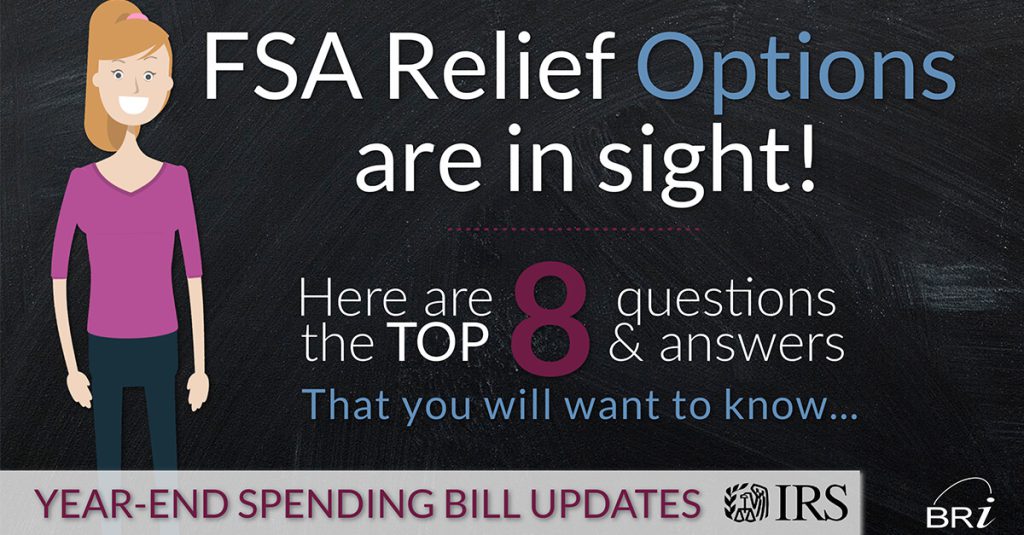We are excited to provide you with some additional insight into the FSA relief options for Health and Dependent Care Flexible Spending Accounts, included in the year-end spending bill signed into law on December 27, 2020. While these provisions are temporary, they provide much-needed relief during these unprecedented times. Plan sponsors should consider several factors as relief options are being evaluated. Remember, it is always advisable to consult your benefits counsel before making any plan changes.
Watch the video below to learn more:
FSA Relief Considerations Q&A
Mid-year Election Change Considerations
Will you permit mid-year election changes without a qualifying event?
By permitting mid-year election changes, participants (and eligible employees) may change their elections without a qualifying event. Employers (also referred to as plan sponsors) may allow participants to:
- Make new elections.
- Increase or decrease existing elections.
- Revoke existing elections.
Permitting these changes would provide the maximum flexibility for participants and eligible employees.
Are you establishing a mini mid-year open enrollment period?
A mini mid-year open enrollment period is a great way to encourage employees to make election changes during a designated period. It concentrates administrative efforts during a set time and encourages timely review and consideration from participants.
Handling of the End of the Plan Year
What options do plan sponsors have for handling the end of the plan year?
Employers will have the option to select from a carryover or extended grace period.
- The carryover allows participants to carry over all remaining funds into the new plan year.
- The extended grace period provides participants with up to 12-months to utilize remaining funds.
What should employers know about the carryover?
Carryover options provide the maximum availability of funds for participants. However, if offering a Health Savings Account (HSA), it will be important that your plan allows for remaining FSA funds to roll into a Limited FSA for HSA-eligible employees. The carryover will also enable employers to close out current and prior plan years and perform the reconciliation process.
With more funds carrying over, please be aware that forfeitures will likely be lower than in previous years but will be more beneficial to participants.
What should employers know about the extended grace periods?
Grace periods provide an extended time to use FSA funds but can become problematic if you offer an HSA. An extended grace period may jeopardize eligibility if even one Health FSA dollar is accessible during a new plan year while a grace period is also running. Unlike a carryover, there is no practical plan option currently available to protect HSA eligibility. Further, an extended grace period will delay the plan reconciliation process by 12 months or more.
Handling of Terminated Employees
Will terminated employees be able to reimburse themselves for expenses incurred after their date of termination?
The full implications regarding terminated employees are not clear at this time and may require additional guidance from the IRS. However, absent additional guidance, we believe plan sponsors choosing to implement this option would be allowing termed participants access to their remaining cash balance in their Health FSA or Dependent Care FSA for services provided after their termination date.
Timing Considerations
What actions should employers take?
Employers will need to amend their plans to take advantage of these provisions. Benefit Resource will be providing additional guidance on the specific steps employers should take soon.
When do plans need to be amended?
Plan sponsors will have 12-months from the last day of the plan year to adopt a plan amendment. For example, plans ending on 12/31/20 will have until 12/31/2021 to adopt changes for the 2020 plan year.
The legislative text allows for plan updates to be made retroactively, and plan sponsors do not need to rush to make changes. Plan sponsors have ample time to weigh their options and conceivably wait for additional guidance before making changes to their plans. For practical purposes, plan sponsors may wish to communicate their intent to adopt changes before the end of their current run-out period.
Please remember this a developing topic. Be on the lookout for additional communications in the coming weeks regarding the next steps to take advantage of these options.
The above considerations are based on guidance and interpretations as of 12/29/2020. Subsequent guidance may impact future communications.



